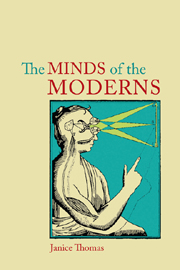Book contents
- Frontmatter
- Contents
- Acknowledgements
- Abbreviations
- Introduction
- I Descartes
- II Spinoza
- III Leibniz
- IV Locke
- 16 Is the mind a substance for Locke?
- 17 Locke's views on self-knowledge
- 18 Locke on consciousness
- 19 Locke on mental causation
- 20 Locke on representation
- V Berkeley
- VI Hume
- Conclusion
- Bibliography
- Index
19 - Locke on mental causation
from IV - Locke
- Frontmatter
- Contents
- Acknowledgements
- Abbreviations
- Introduction
- I Descartes
- II Spinoza
- III Leibniz
- IV Locke
- 16 Is the mind a substance for Locke?
- 17 Locke's views on self-knowledge
- 18 Locke on consciousness
- 19 Locke on mental causation
- 20 Locke on representation
- V Berkeley
- VI Hume
- Conclusion
- Bibliography
- Index
Summary
Near the end of the last chapter it was said that Locke believes that a crucial feature of a human person or consciousness is the fact that each of us is a moral agent with a conscience. Like all our philosophers from Descartes to Hume, Locke clearly thinks that human persons are capable of actions and behaviour that issue from moral choices and decisions, and for which, on Locke's view, the agents will be answerable on the day of judgement. But it might seem that it is only fair to make someone answerable, to praise or blame, punish or reward someone (now or in the afterlife), if it is the case that that person's choices and decisions really do produce the behaviour in question. So we would expect Locke to hold that minds and mental states have genuine causal power.
And, indeed, it appears that this is exactly what he does believe. When he is talking about minds or spirits and what distinguishes them from bodies (in “Of our Complex Ideas of Substances”), he says that “The Ideas we have belonging, and peculiar to Spirit, are Thinking, and Will, or a power of putting Body into motion by Thought” (II.xxiii.18, 306), and again “we find by Experience, that barely by willing it, barely by a thought of the Mind, we can move the parts of our Bodies, which were before at rest” (II.xxi.4, 235).
- Type
- Chapter
- Information
- The Minds of the ModernsRationalism, Empiricism and Philosophy of Mind, pp. 163 - 168Publisher: Acumen PublishingPrint publication year: 2009

